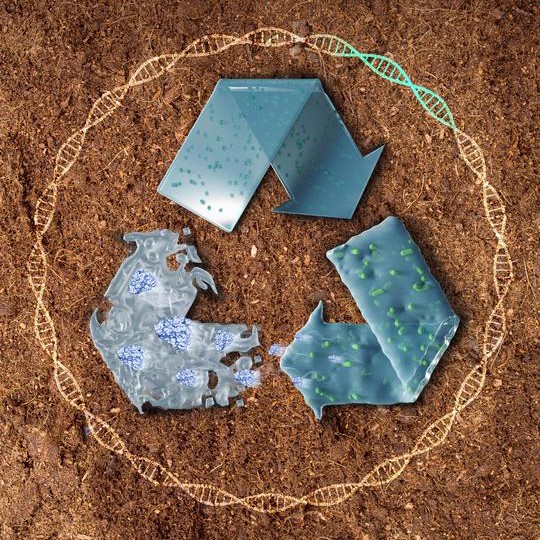Environment
Engineered Spores Create Living Plastics and the Future of Biodegradable Materials
Chinese scientists have programmed spores to break down plastics, marking a significant leap in sustainable materials research
Aug 23, 2024
[DALL-E]
Investigators at Shenzhen Institute of Advanced Technology (SIAT), Chinese Academy of Sciences (CAS), a groundbreaking study titled "Degradable Living Plastics Programmed by Engineered Spores" in Nature Chemical Biology introduces an innovative approach to combating plastic pollution. Researchers have programmed these spores to secrete plastic-degrading enzymes under specific conditions, leveraging the remarkable resilience of spores- known for their ability to survive extreme environments. These engineered spores are embedded directly into plastic materials during manufacturing processes, allowing them to remain dormant and harmless until triggered by environmental factors such as surface erosion or composting. Once activated, the spores initiate a complete degradation of the plastic, potentially revolutionizing how we manage plastic waste.

The Persistent Problem of Plastic Pollution
The invention of plastic was a pivotal moment in industrial history, providing a versatile material that has transformed countless aspects of modern life. However, the widespread production and inadequate disposal of plastics have led to a significant environmental crisis. Plastic pollution is now a global issue, with millions of tons of waste accumulating in landfills and natural ecosystems. In 2016, the discovery of a bacterium, Ideonella sakaiensis, capable of breaking down poly(ethylene terephthalate) (PET) by producing two key enzymes—PETase and MHETase—marked a breakthrough in the fight against plastic waste. Despite this, the development of truly degradable plastics has lagged, with most efforts focused on discovering and evolving plastic-degrading enzymes rather than innovative methods for creating materials that can naturally break down.
Engineering Dormant Spores for Degradable Plastics
Spores, a survival mechanism developed by microorganisms over billions of years, are incredibly resilient to environmental stressors such as dryness, high temperatures, and pressure—conditions that are common in plastic processing. Recognizing this, Dr. DAI's team employed synthetic biology to engineer Bacillus subtilis spores to secrete a plastic-degrading enzyme, lipase BC, from Burkholderia cepacia. When exposed to stressors like heavy metal ions, Bacillus subtilis forms spores, which are then mixed with poly(caprolactone) (PCL) plastic granules. These granules were processed using high-temperature extrusion or solvent dissolution, resulting in "living plastics" that maintained the same physical properties as conventional PCL plastics. During regular use, the spores remain dormant, ensuring the material's durability.
Triggering Degradation: From Dormancy to Decay
The degradation process begins with the release of the dormant spores embedded within the plastic. The researchers identified two primary methods for activating these spores. The first involves using an enzyme, lipase CA, to erode the plastic surface, releasing the spores. Once released, the spores germinate and produce lipase BC, rapidly breaking down the PCL polymer chains. In tests, this method resulted in near-complete degradation of the plastic within just six to seven days, while untreated PCL remained largely intact after 21 days.
The second method, composting, required no additional agents. When placed in soil, the living plastics degraded completely within 25 to 30 days, significantly faster than traditional PCL plastics, which took about 55 days to break down to the point of being invisible to the naked eye.
Expanding the Horizon: Beyond PCL Plastics
While PCL plastics are known for their relatively mild processing conditions, the research team sought to test the system's applicability to other commercial plastics. They embedded spores carrying a green fluorescent protein (GFP) expression plasmid into various plastics, including PBS (polybutylene succinate), PBAT (polybutylene adipate-co-terephthalate), PLA (polylactic acid), PHA (polyhydroxyalkanoates), and even PET (poly(ethylene terephthalate)). Remarkably, after processing these mixtures at temperatures as high as 300°C and physically grinding the materials, the spores could still revive and express GFP. This suggests a broad potential for applying this method to various plastic types.
To test the system's scalability, the researchers conducted a small-scale industrial trial using a single-screw extruder with PCL. The resulting living plastic maintained its rapid degradation ability, breaking down completely within seven days under the right conditions while remaining stable and robust during use, even in harsh environments like Sprite for two months.
A New Era of Sustainable Materials
This study presents a novel approach to fabricating environmentally friendly plastics that balance durability with biodegradability. By harnessing the natural resilience of spores and programming them to degrade plastics only when necessary, this research offers a promising path forward in developing sustainable materials. The success of these "living plastics" addresses the urgent issue of plastic pollution and opens new avenues for innovation in material science.


















